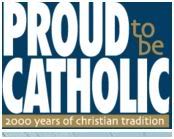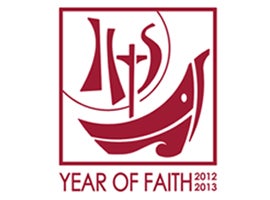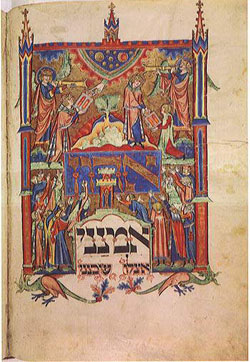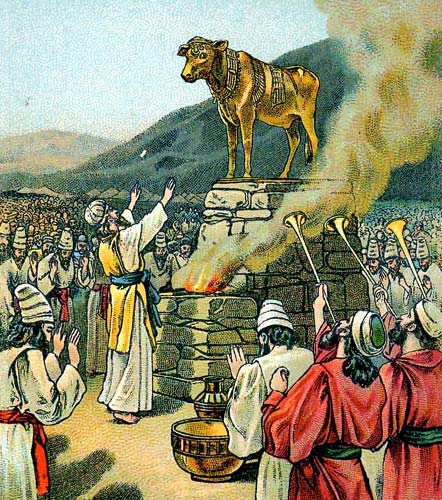For those of us who love sacred, liturgical music, this has certainly been a banner summer. In June, the Church Music Association of America hosted its annual Colloquium in Salt Lake City, Utah. Among the many solid offerings from this venerable conference was an address by Msgr. Andrew Wadsworth, Secretary to the International Commission on the English Language (ICEL). In August, the Archdiocese of Atlanta hosted its annual Southeastern Liturgical Music Symposium. Fr. Uwe Michael Lang, whose name regular readers of this blog may recognize, delivered the keynote address. If that were not enough, even Pope Benedict XVI recently commented on the importance of sacred music in the Mass.
As we near the launch of the Year of Faith, I believe that the subject of sacred music in the liturgy is one of great importance. Last year, the Church gave the English-speaking world the great gift of a new, improved translation of the Roman Missal. This elevated, eloquent new language gave the words we pray during the Holy Sacrifice of the Mass an added and much-needed dosage of the sacred. However, despite the nobility and beauty of the words we are now using in our prayer, lamentably, in many parishes, the quality of the music used in the liturgy continues to suffer.
In this first of a three-part series, I will examine the commentaries that these three individuals made concerning the state of sacred music, and the sacred in general, within the Holy Sacrifice of the Mass. Tonight centers around the commentary made by Msgr. Wadsworth.
In his address before Colloquium participants, Msgr. Wadsworth made reference to this strong disconnect between the Mass and the music used for it. He offered concrete suggestions as to how we can overcome this deficit:
We should seek to see the exclusion of all music from the Liturgy which does not a ‘liturgical voice’, regardless of style.
The exclusion from the liturgy of music which only expresses secular culture and which is ill-suited to the demands of the liturgy. A renaissance of interest in and use of chant in both Latin and English as a recognition that this form of music should enjoy ‘first place’ in our liturgy and all other musical forms are suitable for liturgical use to the extent that they share in the characteristics of chant.
An avoidance of the idea that music is the sole consideration in the liturgy, the music is a vehicle for the liturgy not the other way around!
This last statement hits very, very close to home for me. All too often, well-meaning music directors down here in the South Texas hinterland tend to stretch the "Gathering song" (which is not a liturgical term, but something made up by, I imagine, some publishing house) into eternity. The celebrant has already arrived at the chair and the choir launches full throttle into the second verse. According to the Roman Missal and its accompanying General Instruction, the Entrance Chant (yes, it is a Chant) covers the action of the procession, inclusive of the usage of incense. It should come to an end when the celebrant reaches the chair. It is almost as though the music director, without meaning to, has made the liturgy the servant of the music and not the other way around. Pope St. Pius X makes a very strong case against such a move in his Motu Propio, Tra Le Sollectudini:
22. It is not lawful to keep the priest at the altar waiting on account of the chant or the music for a length of time not allowed by the liturgy. According to the ecclesiastical prescriptions theSanctus of the Mass should be over before the elevation, and therefore the priest must here have regard for the singers. The Gloria and the Credo ought, according to the Gregorian tradition, to be relatively short.
23. In general it must be considered a very grave abuse when the liturgy in ecclesiastical functions is made to appear secondary to and in a manner at the service of the music, for the music is merely a part of the liturgy and its humble handmaid.
The same even holds true for the "Sending Forth" song (again, there is no such liturgical term as "Sending Forth"). The closest term one can find for this is the "recessional hymn". Like the Entrance Chant, this should be brief and used to cover the action of the procession. It should come to its end when the celebrant has left. However, just as with the "Gathering song", this particular piece, in many parishes, goes on into infinity.
Msgr. Wadsworth makes some very solid observations in the three statements that I have highlighted. Working our way from the bottom to the top, we see perhaps the most difficult of his observations, the area of musical suitability. A lot of the parishes down here in the South Texas hinterland use music books by OCP. A couple of them slavishly use the OCP guidebook, "Today's Liturgy" when selecting their songs for a particular weekend's Masses, whether in English or in Spanish. Having leafed through this booklet, I have rarely found anything that even remotely resembles sacred liturgical music. Nine out of 10 times, OCP heavily suggests songs written by their own composers instead of anything traditional, let alone, sacred. Perhaps the worst of the bunch are those selections from "Spirit and Song". The pieces sound like secular soft pop music. This is something that Pope St. Pius X warned against in Tra Le Sollecitudini when he wrote that:
5. The Church has always recognized and favored the progress of the arts, admitting to the service of religion everything good and beautiful discovered by genius in the course of ages -- always, however, with due regard to the liturgical laws. Consequently modern music is also admitted to the Church, since it, too, furnishes compositions of such excellence, sobriety and gravity, that they are in no way unworthy of the liturgical functions.
Still, since modern music has risen mainly to serve profane uses, greater care must be taken with regard to it, in order that the musical compositions of modern style which are admitted in the Church may contain nothing profane, be free from reminiscences of motifs adopted in the theaters, and be not fashioned even in their external forms after the manner of profane pieces.
6. Among the different kinds of modern music, that which appears less suitable for accompanying the functions of public worship is the theatrical style, which was in the greatest vogue, especially in Italy, during the last century. This of its very nature is diametrically opposed to Gregorian Chant and classic polyphony, and therefore to the most important law of all good sacred music. Besides the intrinsic structure, the rhythm and what is known as the conventionalism of this style adapt themselves but badly to the requirements of true liturgical music.
Even though in No. 6, the saintly Pontiff was referencing the problem he was facing from the Italian opera works, I believe that this problem has reared its ugly head again, this time in the proliferation of the Protestant Praise & Worship genre that has infiltrated the Holy Sacrifice of the Mass through LifeTeen and OCP's "Spirit and Song".
I received an email OCP this past week urging me to use their products to create "Vibrant and Engaging" liturgies. Nowhere in the email did I read the words "sacred", "holy", and "reverent." Even as I leafed through the "United in Christ/Unidos en Cristo" book, the one used by a few parishes in my diocese, I did not find very much that could count as sacred. Most of the material came from the St. Louis Jesuits and OCP's own stable of composers. The few traditional pieces of sacred music were heavily edited to the point that OCP removed some very key elements. For example, the Eucharistic elements of "Alleluia, Sing to Jesus" were whittled away. "At that First Eucharist" was re-done and when I was leading the hymn during Mass at my parish, the faithful and I had a hard time because we were used to the traditional version of the song and not the OCP edited piece.
Msgr. Wadsworth made a strong case for the use of the Propers. Not very many parish music directors know this, but, hymns and/or songs, are not the first option to use when choosing music for the Mass. The Propers of the Mass (Introit, Offertory and Communion Antiphon) are the default music for the liturgy. However, here on these shores, we have made the four-hymn sandwich the musical standard for our Masses. The Propers are the liturgical texts that the Church gives us. When we use the Propers, we are not merely singing at Mass; we are singing the Mass. When we sing "Gathering songs" in the beginning, we are merely adding an appendage to the Mass. When the choir and/or the cantor chants the Introit, the Mass is being sung.
But, some may ask, what about active participation? Aren't we supposed to vocalize everything? Active participation has probably been one of the most misunderstood aspects of the liturgical reforms brought about by the Second Vatican Council. Active participation does not merely mean vocalizing the Mass (speaking and singing the parts of the Mass), it also calls for interior participation. We unite our prayers to those who are chanting the antiphons. We sing vicariously through them, pondering the words of the Psalms they are chanting.
Finally, we come to the first observation that Msgr. Wadsworth made. This observation is closely related to the second one. We need to purify the kind of music that is being used for the Holy Sacrifice of the Mass. When Blessed Pope John Paul II wrote his Chirograph on Sacred Music to mark the 100th anniversary of Tra Le Sollecitundi, he noted that:
St Pius X's reform aimed specifically at purifying Church music from the contamination of profane theatrical music that in many countries had polluted the repertoire and musical praxis of the Liturgy. In our day too, careful thought, as I emphasized in the Encyclical Ecclesia de Eucharistia, should be given to the fact that not all the expressions of figurative art or of music are able "to express adequately the mystery grasped in the fullness of the Church's faith"[14]. Consequently, not all forms of music can be considered suitable for liturgical celebrations.
5. Another principle, affirmed by St Pius X in the Motu Proprio Tra le Sollecitudini and which is closely connected with the previous one, is that of sound form. There can be no music composed for the celebration of sacred rites which is not first of all "true art" or which does not have that efficacy "which the Church aims at obtaining in admitting into her Liturgy the art of musical sounds"[15].
Yet this quality alone does not suffice. Indeed, liturgical music must meet the specific prerequisites of the Liturgy: full adherence to the text it presents, synchronization with the time and moment in the Liturgy for which it is intended, appropriately reflecting the gestures proposed by the rite. The various moments in the Liturgy require a musical expression of their own. From time to time this must fittingly bring out the nature proper to a specific rite, now proclaiming God's marvels, now expressing praise, supplication or even sorrow for the experience of human suffering which, however, faith opens to the prospect of Christian hope.
Sadly, it's the very group that was closest to Blessed John Paul's heart, that is now suffering the most from a lack of exposure to genuine sacred music. Well-meaning youth ministers and music directors insist on giving young people heavy doses of "praise and worship" music, even within the confines of the Holy Sacrifice of the Mass, instead of introducing them to what is truly sacred, truly the "Other", the extraordinary. They are being exposed to "road-tested" music that is not necessarily in agreement with the Church's concept of Sacred Music.
Perhaps there will be those who will criticize my words and wonder, what gives benedictgal the right to write such harsh words? Does she even know how to read music? Like Udo Kier once said in a vampire movie, "I have heard that before." In the interest of full disclosure, no, I do not know how to read music...yet. However, while knowing how to read music is certainly important, knowing the authoritative Church documents on liturgy and sacred music is just as important. I would dare say that it is even more important than learning how to read music. Ideally, one should be able to have strong knowledge of both; however, a strong knowledge of where the Church stands on sacred music is perhaps more important. Knowing the Church's documents is of greater import than slavishly and blindly following the recommendations of a publishing house.
While I do have my frustrations with the current state of liturgical music in my diocese, I do share in Msgr. Wadsworth hope that we will soon turn a corner. Organizations like the CMAA are certainly playing a leading role in this Had it not been for composers like Adam Bartlett, I would not have been exposed to the beauty of the Simple English Propers.
As Fr. Z likes to say, "Brick by brick."











